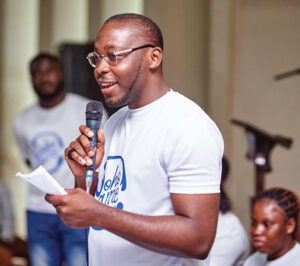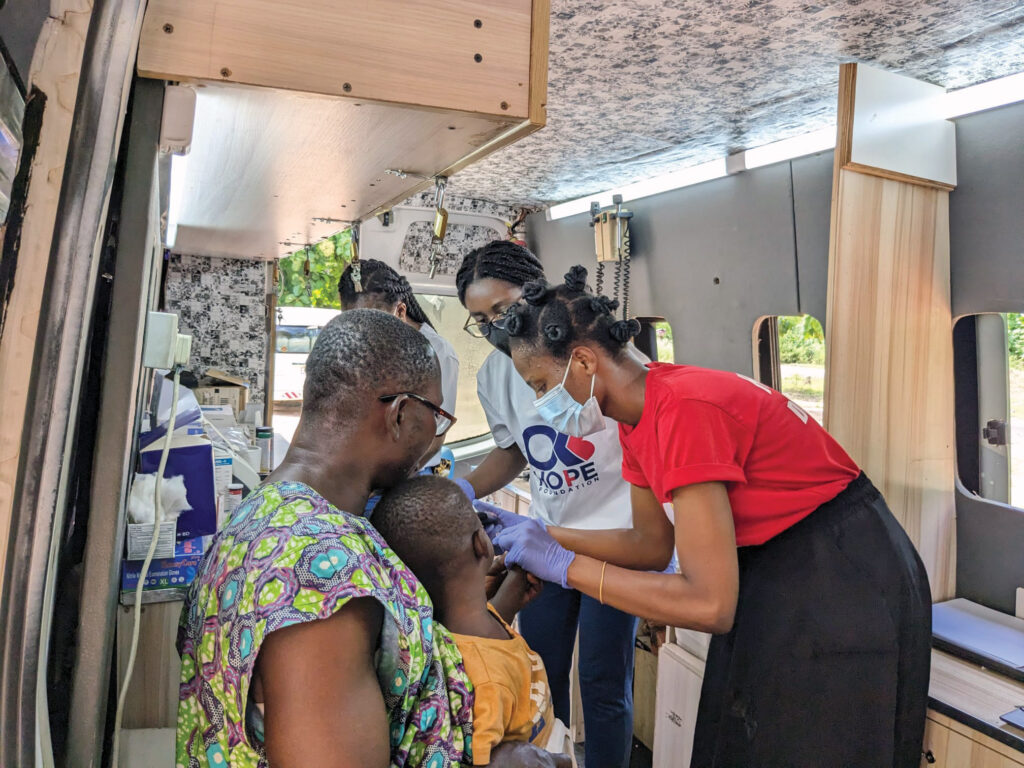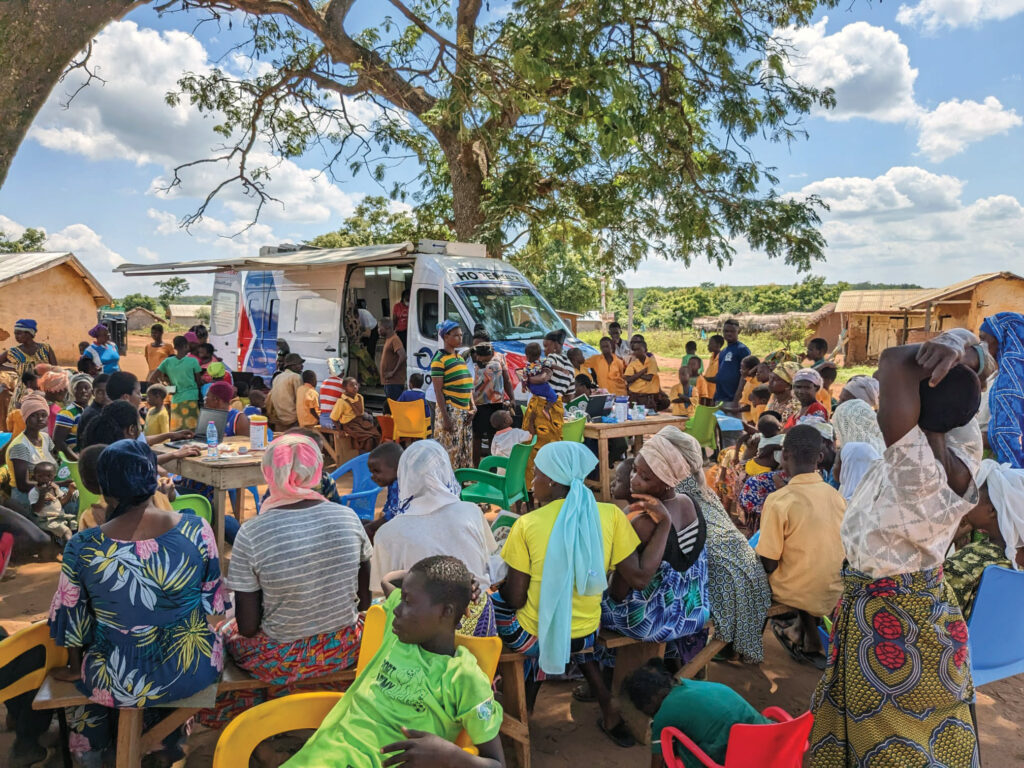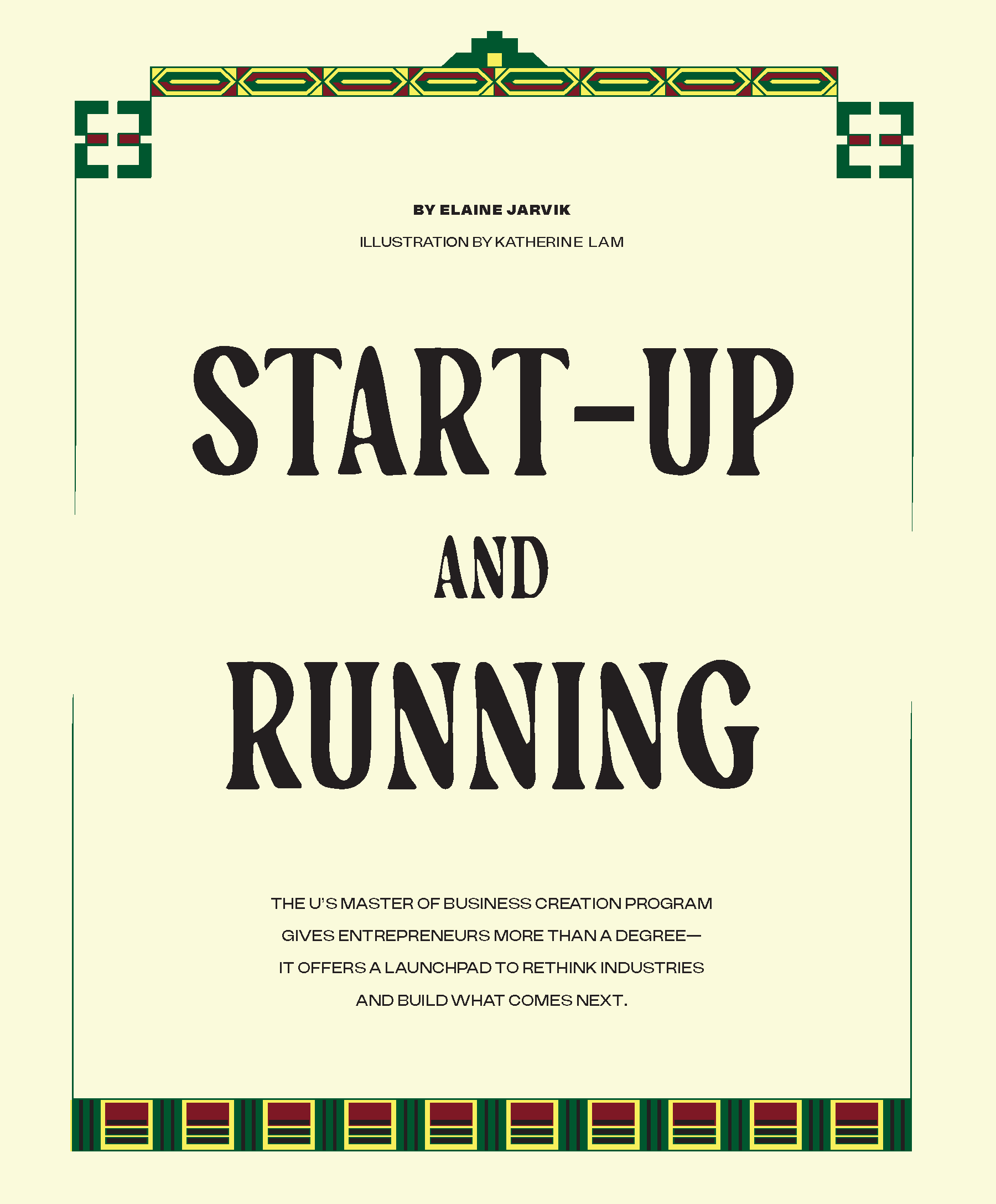 The night his grandmother died—after a 45-minute taxi ride to a clinic where it turned out there was no one to help her—Osei Boateng MBC’24 vowed to become a doctor when he grew up. He was 15 then, a grieving boy with a big heart, who lived in a Ghanaian village where people often died because they couldn’t get adequate care.
The night his grandmother died—after a 45-minute taxi ride to a clinic where it turned out there was no one to help her—Osei Boateng MBC’24 vowed to become a doctor when he grew up. He was 15 then, a grieving boy with a big heart, who lived in a Ghanaian village where people often died because they couldn’t get adequate care.
Now, 15 years later, Boateng’s heart is still big, but his plans have grown bolder—which led him, in 2023, to the U’s Master of Business Creation (MBC) program, which is provided by the Department of Entrepreneurship & Strategy in partnership with the Lassonde Entrepreneur Institute at the David Eccles School of Business.
By then he had already created a nonprofit foundation that brought mobile health clinics to rural Ghanaian villages. Now he wanted to learn how to expand those services, as well as create a for-profit company that would change the way medicine is paid for in Ghana and beyond.

The meager shorthand for Boateng’s goals might be “health care access,” but that hardly captures what it looks like on the ground. Click, instead, on a video CNN made when it selected Boateng as a Top 10 global “Hero” two years ago and you’ll see a van bumping along red clay roads, dodging potholes and mud. Inside the van are blood pressure cuffs, glucose monitors, portable labs, and vaccines. When the vehicle finally arrives at a tiny village, eager people line up to be measured, poked, and counseled. In the middle of it all is Boateng, with his lilting voice and ready smile.
OneHealth+, the second start-up that Boateng brought to the U’s MBC program, is one that operates in the less tangible world of blockchains and digital. To understand its goal, imagine the kind of village where Boateng grew up, where a sick man might walk for hours to get to a hospital, or might choose not to go at all because he can’t pay the bill.
For years, Ghanaians in poor rural areas like this have sometimes relied on remittances from relatives who have moved to more affluent countries—relatives who want to ensure the money is used for medical care but can’t guarantee that it will be or that the exchange rate will result in sufficient funds.
Boateng’s idea is a method of transferring “health credits,” via a secure blockchain, from anywhere in the world. He is also working with small Ghanaian businesses that can’t afford to provide costly medical insurance to their employees but could instead provide health credits for doctor’s visits and hospital care.
Boateng, who emigrated with his family from Ghana to New Jersey after high school and then got a scholarship to Cornell University, had planned to go to medical school but decided that he could have a bigger impact by studying health care policy. He went on to earn a master’s in health care administration at Cornell, started the OKB Hope Foundation, worked in hospital administration in Detroit, and eventually found his way to the MBC program in Utah.
Lots of brilliant ideas for new businesses are dreamed up every day in the shower. But what the Master of Business Creation program looks for, says MBC director and entrepreneurship professor Paul Brown BA’89, is a brilliant idea plus something that already sets it in motion—customer revenue, investment capital, a prototype, or the formation of a business entity.
There is no other program like the MBC in the world, says Brown; it’s a master’s program that is both a learning experience and a start-up accelerator, providing practical skills a founder can immediately use to run an actual company. The program, first imagined by U of U vice president for innovation Troy D’Ambrosio BA’82, provides one-on-one mentoring from local and national business experts, and a due diligence framework that requires student founders to meet several stringent operational benchmarks for their business before they graduate. Forty-five percent of the founders are women, atypical for the start-up world, says Brown.

The MBC program has won several awards for its innovative curriculum and has grown rapidly. In addition to the David Eccles School of Business underwriting many of the costs, gold mining and investment legend Pierre Lassonde MBA’73—who founded the university’s Lassonde Entrepreneur Institute in 2001—and the Lassonde Family Foundation provided substantial financial support to keep the program affordable, says Brown.
Three years ago, the program introduced an online track for founders across the U.S., and in 2024 it added MBC Global, led by marketing professor Jeff Davis BA’86 BS’86. It currently operates in four African countries, with plans to expand later into Asia and Europe.
A balance between gumption and a willingness to learn is what makes an MBC entrepreneur successful, says Brown. “You need grit to get over the fact that people are going to constantly tell you your idea won’t work, it’s never been done before, we’re not going to give you money. But you can’t be so single-minded in your devotion to that dream that you’re not coachable.”
Since launching in 2019, the MBC program has graduated over 200 start-up founders, with products and services ranging from collectible knives to virtual migraine care to Rena Vanzo’s audaciously named Boob Bus, which brings mammograms and genetic testing to women in Utah.
Vanzo MBA’22 MBC’24, a genetic counselor, knew that Utah ranked in the bottom five states in the U.S. for mammogram compliance. Like Boateng, she envisioned a clinic on wheels that could reach people who lacked the time or inclination to visit a medical center. Her Boob Bus, where she serves as director, genetic counselor, and bus driver, also provides a questionnaire to estimate a woman’s lifetime risk of breast cancer.
The MBC program, she says, gave her not only practical tools—about insurance, marketing, regulatory compliance, and the competitive landscape—but also emotional support from colleagues, and one-on-one guidance from her mentor, Dan Kossmann, a Boston-based former CFO at several tech and health care companies. Kossmann has mentored 10 MBC founders so far, including Boateng.
“If you really want to understand the MBC program,” Kossmann says, attend the hooding ceremony each May, where founders tell their stories. “There’s not a dry eye in the house.”
On a frigid morning this past January, University of Utah’s Stena Center for Financial Technology hosted the 2025 Fintech Xchange conference in downtown Salt Lake. Inside the ballroom was a sea of people in dark suits and fleece. Outside in the lobby, Boateng sat on a couch wearing a Ghanaian robin’s-egg-blue shirt and pants, holding Zoom meetings with his colleagues in Kumasi. He had come back to Salt Lake to connect with people in the business school and do what occupies much of his time these days: courting potential investors.
His goal, as always, is to keep his mobile clinics on the road and OneHealth+ on track. He has also added a third component: mental health education in Ghanaian high schools, as well as an AI therapy app. Only 70 psychiatrists, he notes, currently serve the country of 32 million people.

“Osei is a master at getting people passionate about his business and his vision,” says mentor Kossmann. “He’s one of the nicest, most soft-spoken, friendliest people you’ll ever meet.”
He reaches out, it seems, to everybody. At home in Ghana, he works constantly to recruit Ghanaian volunteers as well as community leaders and pastors in each village the OKB Hope Foundation visits. When he was in Salt Lake City in January, he made it a point to meet with Fernando Morales and Patrick Doss, two science and information systems master’s students who had been working with him, via Zoom, to create data graphics for the mobile clinic.
“I just wanted to meet you in person and express my heartfelt gratitude,” he told them.
Boateng splits his time between Ghana and the U.S., where he doggedly looks for donors and investors. So far, his mobile clinic has visited some 10,000 people in 80 villages—but he estimates there are 13 million rural Ghanaians without adequate health care. The OKB Hope Foundation has recently bought a second van, but the first van has traveled so many miles that it’s on its last legs.
Asked if he ever gets discouraged—about trying to meet a payroll, about an ailing van, about investors who are interested but have not yet promised funds—he says, “Oh yeah, I do. You are doing all the good work, trying your possible best, but the resources are limited.” But, he adds, “you also remember the people who might not get health care, who might lose their lives if you’re not doing your work.”
He recalls the first time he and his team took the mobile clinic on the road, headed to the Ashanti village of Bodomase. Torrential rains had flooded the area the day before, and the van got stuck in the mud. Their clothes drenched and their hands blistered from digging themselves out, they arrived hours late to the village. “But our spirits were unwavering,” he says.
His goal, in the next five years, is to have 25 vans visiting all 16 regions in Ghana. And, eventually, he wants to bring consistent, high-quality medical care—and his OneHealth+ payment system—not just to remote areas of Ghana but beyond, to the rest of sub-Saharan Africa. u
Elaine Jarvik is a Salt Lake City-based freelance writer and playwright.




He should apply to the Bill Gates Foundation for funding, if he hasn’t already. Bill Gates intends to give away his fortune within two decades and much of his funding is for the African Continent.